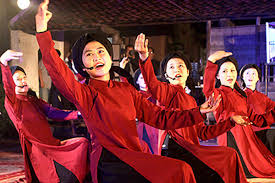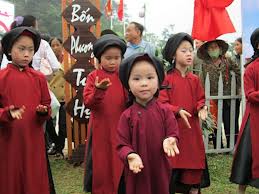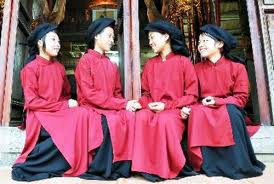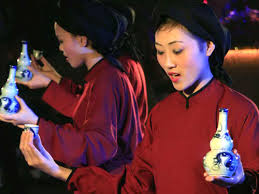
XOAN SINGING IN PHU THO PROVINCE
Xoan singing has existed for more than 2,000 years since Hung Kings dynasty
Xoan singing or hat cua dinh (singing at the communal house) is a kind of performing art relating to worshipping gods. In the past, Van Lang people held Xoan singing performance in the spring to welcome the new year. There are three formsof Xoan singing as the worship singing to commemorate Hung Kings and village guardian gods; the ritual singing to pray for good crops, good health; and the festive singing – a form of love duet.
Xoan singing has existed for more than 2,000 years since Hung Kings dynasty. So all old Xoan songs originated from ancient  villages in the center of Van Lang nation (now Phu Tho Province), after spread out the villages in the two banks of Lo and Hong rivers. Four old Xoan guilds are An Thai, Phu Duc, Kim Doi and Thet in two communes of Kim Duc and Phuong Lau (Viet Tri City, Phu Tho Province).
villages in the center of Van Lang nation (now Phu Tho Province), after spread out the villages in the two banks of Lo and Hong rivers. Four old Xoan guilds are An Thai, Phu Duc, Kim Doi and Thet in two communes of Kim Duc and Phuong Lau (Viet Tri City, Phu Tho Province).
The Xoan guilds perform Xoan singing at the village’s communal house according to phrases as follows:
Firstly, the worship singing to commemorate Hung Kings, village guardian gods, the people who had merit for the country and families’ ancestors through the repertoires of Giao trong and Tho nhang…
Secondly, the ritual singing (with 14 different melodies) to express admiration of nature, human beings, and communities’ life, and some repertoires about history such as Trang Mai cach and Hoi lien cach…
Finally, the festive singing is alternate singing between singers and instrumentalists. The audience could take part in singing together with Xoan guilds to express love and dreams about happiness through melodies of Mo ca (groping for fishes), Xin hue (asking for flowers), Bo bo…
Most Xoan songs were composed by common people following poetry styles such as seven-seven-six-eight-word-meter verse,  seven-beat-meter verse, six-eight-word-meter verse, the variants of six-eight-word-meter verse, four-word verse, and six-word verse. Xoan music has a simple structure with few ornamental notes. It often uses three-note scale and four-note scale with simple rhythm.
seven-beat-meter verse, six-eight-word-meter verse, the variants of six-eight-word-meter verse, four-word verse, and six-word verse. Xoan music has a simple structure with few ornamental notes. It often uses three-note scale and four-note scale with simple rhythm.
Xoan guilds are the places where folk artists keep their close relationship, creating the specific feature of Xoan singing. Xoan guilds often gather and perform in the spring festivals. After the festivals, the practitioners of Xoan guilds return to work as everyone in the community. Each Xoan guild has 15 – 18 members, of which one leader is referred to as Trum, male practitioners are called Kep (instrumentalists) while female practitioners are called Dao (singers)… The leader is an expert in art and mastered in all customs of Xoan singing. He is also responsible for organizing and training instrumentalists and singers. Knowledge on practice, custom and regulations of taboo, and techniques for singing, playing drum and clappers and dancing of Xoan singing were always transmitted orally from this person to another in the community.
On November 24th 2011, at the 6th meeting of the Inter-governmental Committee for the Conservation of Intangible Cultural  Heritage of UNESCO held in Bali, Indonesia, Xoan singing in Phu Tho was officially recognized by UNESCO as an Intangible Cultural Heritage in need of urgent safeguarding. It meets necessary requirements as unique lyrics, melodies and tunes; combining elements of culture, history and art; containing many cultural values; and having been preserved through many centuries
Heritage of UNESCO held in Bali, Indonesia, Xoan singing in Phu Tho was officially recognized by UNESCO as an Intangible Cultural Heritage in need of urgent safeguarding. It meets necessary requirements as unique lyrics, melodies and tunes; combining elements of culture, history and art; containing many cultural values; and having been preserved through many centuries


 Royal Gate
Royal Gate
 NIKKO HANOI
NIKKO HANOI
 Trade Union Hotel Hanoi (Congdoan hotel)
Trade Union Hotel Hanoi (Congdoan hotel)
.jpg) Cultural Hanoi
Cultural Hanoi
 North Vietnam Exclusive
North Vietnam Exclusive
 Attractive North
Attractive North
 Charming North
Charming North

